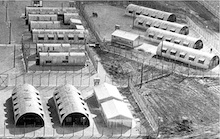
Unionist paramilitaries who killed more than 100 people during the first 18 months of internment escaped detention because the British government believed there was “no serious Protestant threat” to the state, newly discovered papers reveal.
In August 1971 the government introduced internment in what it said was an operation designed to stem the conflict. The British government had urged then Stormont prime minister Brian Faulkner to include a few Protestants in the trawl but he refused.
Up until February 1973 it was only used against nationalists, despite the fact that unionist paramilitaries had been responsible for more than 100 killings in 1972 alone.
Throughout its four-year lifespan, 1,874 nationalists were interned as opposed to just 107 loyalists. Most of them were placed in Long Kesh, a former RAF station, which became akin to a concentration camp.
The British government has always denied claims that internment was designed solely to be used against nationalists.
Despite the UDA and UVF having killed 400 people between 1972 and 1975, secret government papers now reveal that British forces operated an official policy designed to avoid interning Protestants.
In December 1972 a Ministry of Defence memo, titled ‘Arrest Policy for Protestants’ states: “Ministers have judged that the time is not at the moment ripe for an extension of the arrest policy in respect of Protestants”.
Another memo to British army chiefs, states: “It is very difficult to lay down precise criteria for arrestable Protestant terrorists.”
A senior British military official, AW Stephens later wrote that even the term ‘Protestant terrorists’ had been met with opposition when the draft guidelines were forwarded to the RUC.
In response to the Dublin government questioning why only nationalists and no loyalists were being interned, a British memo stated that there was “no serious Protestant threat” but admitted that during the later part of 1973 “this argument probably did not apply”.
However, the secret memos reveal that even after it had killed more than 170 people, the British government was reluctant to intern UDA members.
The secret papers were discovered by the Pat Finucane Centre at the National Archive at Kew Gardens.
Spokesman Paul O’Connor said: “These documents are important in that they authenticate for the first time the true nature of the British security policy in the north during the early 1970s.
“They confirm that internment was used almost exclusively against republicans and that for 18 months, when more than 100 Catholics were murdered, the British government steadfastly refused to intern their loyalist killers.”
In February 1973, the British government finally reluctantly agreed to intern UVF and UDA killers after public revulsion over the murder of Catholic joiner Patrick Heenan, who had been oen of 14 workmen en route to build a Catholic primary school in east Belfast.
The decision led to major street protests and a strike that saw electricity cut to large parts of Belfast for a number of days.
His killer later turned supergrass and admitted that members of the Crown forces had regularly passed information on to the UDA and UVF throughout the 1970s.
Heenan’s family say they are appalled at the new revelations.
Patrick Heenan’s son Eugene said: “How many people would have been alive today if the British government had not refused to intern loyalists?... The families of those killed deserve answers as to why the government allowed this to happen.”
![[Irish Republican News]](https://republican-news.org/graphics/title_gifs/rn.gif)
![[Irish Republican News]](https://republican-news.org/graphics/title_gifs/harp.gif)

